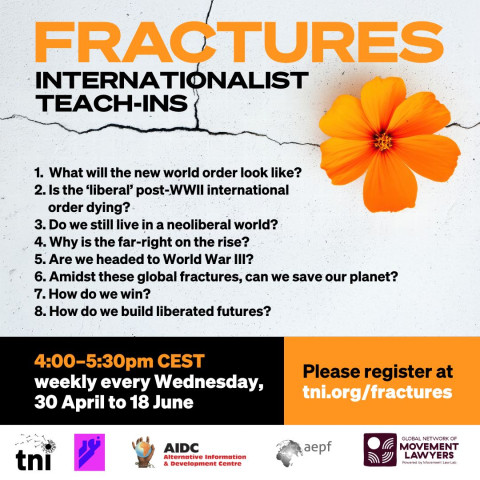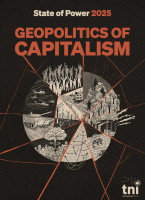Fractures Internationalist teach-ins
Fractures was an eight-week teach-in series designed to go beyond the headlines and uncover the deeper forces shaping our world. Leading thinkers and activists from across the globe analysed the challenges we face and explored strategies for resisting injustice and building a just, sustainable future. While the live sessions have concluded and registration is now closed, all recordings and session summaries remain available for those who want to engage with the content at their own pace.
You can find the recordings and the PDF summaries below.

Themes and quotes from the series: A visual summary
Programme
All sessions were (co)moderated by Shaun Matsheza and ran from 30 April to 18 June.
Session 1: What will the new world order look like?
What is the future for US imperialism? What are China’s global aspirations? Can the global South be a collective agent for progressive change?
- Achin Vanaik, Retired Professor of International Relations, University of Delhi,
- Aziz Rana, author of the Two faces of American freedom
- Ho-Fung Hung, author of Clash of Empires: From ‘Chimerica’ to the ‘New Cold War’
- Luciana Ghiotto, Trade and Investment researcher and activist at TNI
Fractures Session 1 - What will the new world order look like (PDF, 4.82 MB)
Session 2: Is the ‘liberal’ post-WWII international order dying?
What was the promise and reality of the liberal order? Did it deserve to die? What is the future for international law and multilateralism? What will replace it? What should we demand in its place?
- Aslı Ü. Bâli, Professor of International Law at Yale Law School
- Shahd Hammouri, Lawyers for Palestinian Human Rights/University of Kent
- Jomo Kwame Sundaram, former assistant secretary-general at UN-DESA
- Co-Moderator: Meena Jagannath, Movement Law Lab
Fractures Session 2: Is the ‘liberal’ post-WWII international order dying? (PDF, 4.64 MB)
Session 3: Do we still live in a neoliberal world?
How are the dynamics of capital and class changing? How is Big Tech reshaping capitalism? How does muscular state capitalism and trade wars reshape neoliberalism? How should we articulate public democratic economic alternatives? Can we re-create a democratic state, which has been so delegitimised by corporate take-over, cronyism and corruption?
- Quinn Slobodian, author of Hayek’s Bastards: Race, Gold, IQ and the Capitalism of the Far Right
- Daniel Chavez, co-author of The Future is Public and coordinator of TNI's Global Green Industrial Policy Lab
- Anita Gurumurthy, director of IT for Change, India
- Sofia Scasserra, TNI associate researcher who specialises on digital economy, labor and development.
Fractures Session 3: Do we still live in a neoliberal world? (PDF, 3.69 MB)
Session 4: Why is the far-right on the rise?
What is the agenda of the far-right? How has the far-right secured the support of anti-elite anger – and appeased by the traditional right? Where did the left go wrong? How can we survive authoritarian rule and best resist misogyny and racism? Where are the fractures in the Right that need to be broken open?
- Joe Mulhall, Research Director at Hope not Hate and author of Drums In The Distance: Journeys Into The Global Far Right
- Ailynn Torres Santana, Professor and researcher at FLACSO Ecuador
- Raqib Hameed Naik, Executive Director of the Center for the Study of Organized Hate (CSOH).
- Co-moderated: Maie Panaga Babker, Noor
Fractures Session 4: Why is the far-right on the rise? (PDF, 3.41 MB)
Session 5: Are we headed to World War III?
How did global armament become hegemonic? What are the intentions of global powers? How do we slow down the arms race? How will tech change warfare? How can we rebuild the global peace movement?
- Niamh Ni Bhriain, coordinator of TNI's War and Pacification programme
- Samar Al-Bulushi, professor of anthropology at UC Irvine and author of War-Making as World-Making: Kenya, the United States, and the War on Terror (2024)
- Andrew Feinstein, Shadow World Investigations and editor of Monstrous Anger of the Guns: How the Global Arms Trade Is Ruining the World and What We Can Do About It (2024)
- Co-moderator: Anuradha Chenoy, Adjunct Professor, Jindal Global University (Haryana, India) and Asia-Europe Peoples' Forum.
Fractures Session 5: Are we headed to World War III? (PDF, 7.66 MB)
Session 6: Amidst these global fractures, can we save our planet?
Why has the existential threat of climate crisis been cast aside by so many centrist and far-right political leaders? Why is climate denialism on the rise? What are the paths today towards ecological and climate justice?
- Tasneem Essop, Executive Director of Climate Action Network International
- Julia Steinberger, Professor of Societal Challenges of Climate Change at the University of Lausanne
- Maureen Santos, FASE, Brazil
- Lavinia Steinfort, TNI researcher and co-author of Reclaiming Energy (2024)
Fractures Session 6: Amidst these global fractures, can we save our planet? (PDF, 7.94 MB)
Session 7: How do we resist and win?
What will social movements look like in the newly emerging era? What does global resistance look like? How do we build a new common sense in an age of internet eco-chambers? What can we learn from recent and past uprisings and movements to sustain them and take power?
- Shanelle Matthews, Founder of Radical Communicators Network and co-editor of forthcoming Liberation Stories: Building Narrative Power for 21st-Century Social Movements
- Nimmi Gowrinathan, activist, scholar and founder of the Politics of Sexual Violence Initiative and author of Radicalizing Her (Beacon Press 2021)
- Tooba Syed, feminist labour organiser, Pakistan
Fractures Session 7: How do we resist and win? (PDF, 4.89 MB)
Session 8: How do we build liberated futures?
What are our imagined liberated futures? How can we build these within and beyond a fractured world? What are the alternatives that social movements are investing time, energy, resources and solidarity into building and sustaining?
- Kali Akuno, co-founder and director of Cooperation Jackson, USA
- Blessol Gathoni, Queer Social Rights Activist and Community Organizer, Kenya
- Lyn Ossome, Associate Professor and Director of the Makerere Institute of Social Research, Uganda
- Co-moderator: Hakima Abbas, African feminist and popular educator
Fractures Session 8: How do we build liberated futures? (PDF, 7.92 MB)
